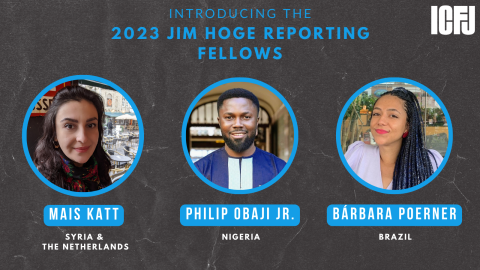
A reporter known for her coverage of the Syrian War, a journalist in Nigeria specializing in Russia’s involvement in West Africa, and a journalist who reports on climate and gender in Brazil are the inaugural recipients of the Jim Hoge Reporting Fellowship.
Through the fellowship with the International Center for Journalists (ICFJ), Mais Katt of Syria, who is based in The Netherlands, will publish a longform multimedia series on three women affected by the protracted Syrian crisis. Philip Obaji Jr. will produce an investigative report about the involvement of Wagner – Russia’s mercenary group – in clashes across West Africa. Bárbara Poerner of Brazil will publish a documentary series on the social impacts of energy projects in South America.
The fellowship is designed to support rising news leaders in the U.S. and abroad, helping the next generation of journalists produce high-quality news and advance their careers. The fellows will receive funding and support to pursue three-month reporting projects on pressing global issues.
ICFJ launched the Jim Hoge Legacy Fund this year to carry on Jim Hoge’s legacy as a leader in the field of journalism who upholds the highest standards of excellence, analysis and integrity. “It is an honor to recognize Jim, one of the most influential editors of our time,” says Jason H. Wright, who serves on ICFJ’s board of directors as development chair. Hoge is vice chair of the board and was previously its chair.
Hoge, who has long supported young reporters over his career, embodies the best of journalism. He was a venerated leader as editor of the Chicago Sun-Times and publisher of the New York Daily News. In his 18 years as editor of Foreign Affairs, Hoge demonstrated unmatched excellence in fact-based journalism and offered deep analysis of global issues.
The inaugural fellowship recipients were selected from the more than 15,000 members of the ICFJ Pamela Howard Forum on Global Crisis Reporting for their dedication to the same high standards that Hoge has upheld his entire career.
Mais Katt (Syria & The Netherlands)
Katt has closely covered the Syrian war for 10 years. She is the editor and fact-checker of The Syria Trials podcast, which illustrates the scattered landscape of justice and accountability efforts for the crimes committed by war criminals in Syria. She is an experienced media trainer and news business developer, having collaborated with Lighthouse Reports and two long-time ICFJ partners: the Arab Reporters for Investigative Journalism (ARIJ) and the Organized Crime and Corruption Reporting Project (OCCRP) and she is the MENA editor of The Environmental Investigative Forum (EiF). Katt has conducted training programs for hundreds of journalists in the MENA region, including for ICFJ.
As a Jim Hoge Reporting Fellow, Katt will report on the stories of three Syrian women from the start of the demonstrations in 2011 to the present day. These three stories include experiences of being in the diaspora, staying in Syria, and working in women-centered organizations. Focusing on reframing women as advocates for peace, justice and freedom rather than as victims, this project will take the form of longform multimedia storytelling.
Philip Obaji Jr. (Nigeria)
Obaji is a correspondent for The Daily Beast covering sub-Saharan Africa. His coverage includes reporting on jihadism, human trafficking, human rights and, more recently, the activities of Russia's Wagner Group in Africa. He won the Future Awards Africa Prize in Education in 2014, and the Future Awards Africa Prize for Young Person of the Year in 2015. Obaji was listed among the 100 most influential people in Nigeria in 2016 by the Nigerian news website, YNaija. In 2022, he was awarded the Jaime Brunet International Prize for the promotion of human rights by the Public University of Navarra in Spain.
Obaji was awarded a Jim Hoge Reporting Fellowship for his project to continue investigating the Wagner Group’s actions in Africa, particularly the “climate of terror and complete impunity” that a United Nations working group has described. For his longform reporting project, Obaji will interview massacre survivors and work to identify individual Wagner Group operatives.
Bárbara Poerner (Brazil)
Poerner reports at the intersection of women's rights, climate justice and cultural issues, working for media outlets Climainfo Institute and EmpoderaClima, and collaborating as a freelance reporter with other Brazilian media. Previously, she worked as a reporter for ELLE Brasil magazine and has experience with audiovisual reporting, including documentary web series and podcasts.
Through four podcast episodes in Portuguese and video content in English, Poerner’s docuseries will explore how energy projects across South America - whether renewable or not - can have disastrous consequences for local communities, including Indigenous people, and are part of the climate crisis. Her final episode will focus on recommendations for a fair, free and community-oriented energy transition that protects the rights of both humans and minimizes harm to the planet.